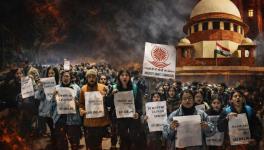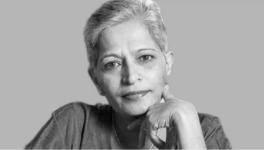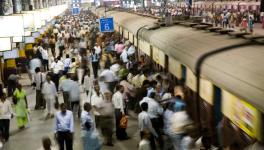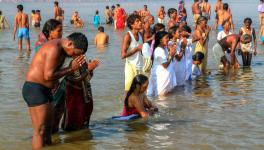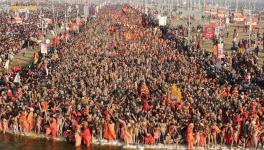‘My 500 Days in Jail Taught Me to Speak Out For Others’—Dr Kafeel Khan
Dr Kafeel Khan has come a long way. From a hero lauded for providing oxygen to children at the BRD Medical College during an extreme shortage in the oxygen supply in 2017, he now finds himself dismissed from service on what are widely regarded as flimsy charges. Dr Khan explains to NewsClick his torturous quest for justice, how prison time changed him, and his new role as a doctor-activist.
In August 2017, around 100 children died in a few short days in BRD Medical College in Gorakhpur, Uttar Pradesh, during a disruption in medical oxygen supplies. This year, the second wave of the Covid-19 pandemic claimed more lives due to oxygen shortages. But the Centre denies that oxygen supplies caused deaths, just like the Uttar Pradesh government had in 2017—enquiry committees after the BRD tragedy said the deaths were not due to oxygen shortage. What were your thoughts when there were oxygen shortages during the pandemic?
It was like déjà vu for me. What I witnessed over April-May 2021, when the whole country was suffering due to a shortage of oxygen, was a repetition of what I had seen at BRD Medical College in Gorakhpur on 10 August 2017. Then health minister subsequently said that not a single death happened in Gorakhpur [on that date] due to oxygen shortage. This year, during the monsoon session of Parliament, our Minister of State for Health [Bharati Pravin Pawar] made a similar claim. She informed the Rajya Sabha that the country had not suffered a single death due to oxygen shortage during the Covid-19 wave of April and May this year.
We all know how hospitals across the country were using social media to put out SOS alerts about running short of oxygen. Even AIIMS, the most premier health facility in the country, sent an alert stating they were short on liquid oxygen. Sadly, the government is always in denial mode. In my case, I was made a scapegoat. It is this denial mode that saw the Uttar Pradesh government file FIRs against hospitals that went public about oxygen shortages in April. The [Chief Minister] Yogi [Adityanath] government went to the extent of filing FIRs in Lucknow against ordinary citizens who used social media to plead for help to access an oxygen cylinder.
These incidents also reflect very poorly on the health infrastructure of our country...
Yes, indeed. This is the point I have been making in all my social discourses. Our health system is in shambles. This has been the case not only during the last seven years of the [Prime Minister Narendra] Modi regime. Successive governments have neglected the health sector in the last 75 years of Independence. We spend just one per cent of our GDP on health whereas the rest of the world is spending between six to eight per cent of their annual GDP on health. After the Covid-19 pandemic, [other countries’] governments are spending up to 10% of GDP on health, whereas we [India] increased our spending from one to 1.25%.
Our health infrastructure did not collapse due to the Covid-19 pandemic. Instead, the Covid 19 pandemic has served to highlight the limitations under which it is functioning. It is for this reason that I have started a Health For All campaign that focuses on providing good health care across all age groups.
Why do you say our public health system is in shambles? Just before Covid, the Prime Minister announced the Ayushman Bharat Yojana, which would cover the poorer sections with medical insurance up to Rs. 5 lakh.
When Modi was campaigning in 2014, he promised that if he came to power, he would ensure every Indian citizen be provided with proper health care. Late [Union Defence and Finance minister] Arun Jaitley had proudly announced the Swastha Bharat Samriddha Bharat scheme on the floor of the Parliament, which would provide ten crore families with health insurance of up to Rs 5. lakh for a year.
If we make a rough calculation, then if each family has an average of five members, the figure goes up to around 50 crores. If each family spends a minimum of between Rs. 20,000 to Rs. 50,000 on health, then this works out to an expense of between Rs. 2 to Rs. 4 lakh crore. But the government allocation for the Ayshuman Bharat Yojana in 2018 was just Rs. 2,000 crore which was raised to Rs. 6,000 crore for 2019. For the current year, the allocation is down to Rs. 400 crore. How then can we expect a scheme like this to get implemented?
The Modi government has also announced that the country’s Sub Health Centres would all get turned into Wellness Centres. What do you think about this proposal?
The government plans to start 1.5 lakh Wellness Centres across the country in the next two to three years. Again, if one does a rough calculation, each of these centres would cost around Rs. 4 crores in small towns, while in the metros, their cost would be around Rs. 5 crores. This excludes the cost of the land, which the government will presumably provide. The cost of 1.5 lakh Wellness Centres works out to Rs. 6 lakh crore. Where is the money to support such a scheme? The government has allocated Rs. 6,000 crore for these Wellness Centres in the current fiscal year. Our entire health budget allocation for 2021-’21 is Rs. 64,000 crores, of which Rs. 40,000 crores is spent on salaries.
Turning to the personal, how have you dealt with the trauma of the last four years?
It has been a horrible situation. The Uttar Pradesh government did not pay the Rs. 64 lakh [it owed] to the oxygen supplier [in BRD Medical College]. When the state government came to power in 2017, the new Chief Minister slashed the health budget by 50%. I am a doctor and it was not my job to bring oxygen cylinders to the hospital to save the lives of the children. I am a paediatrician, my job at BRD was to teach medical students and look after sick children. Procuring oxygen cylinders was the job of the hospital administration. However, I was not the only doctor trying to help the children that August. It is not that I am a hero. There were sixteen junior doctors, nurses, ward boys and sweepers, all of whom worked 54 hours non-stop—and what did we get?
Initially, the hospital wanted to bury the whole incident. If you remember, then Health Minister Siddharth Nath Singh made a statement on 12 August 2017 that “Agast mein mautain hoti hai—Children always die in August.” He even said, “16.5 kids died per day last year, this year 20.5 kids have died per day”. He had calculated the deaths in numbers.
When they could not bury the incident, they tried to blame me by claiming I was trying to steal oxygen cylinders. The real culprits were the health minister and the principal secretary in Lucknow, who had not paid the oxygen supplier. The supplier had written at least 14 letters to the government, and their agent told the enquiry commission that the concerned officials had wanted a ten per cent commission.
What is the current budget for the state ministry of health?
It [the health budget] has been increased. The budget of the BRD hospital has [also] increased, and they are getting more buildings and equipment, but they have not increased the strength of their doctors and nurses. When a government comes up with slogans such as ‘shamshan and kabristan’ and the Chief Minister announces the state election will be fought between ‘nationalists’ and the ‘Jinnahvadi’ brigade, then real issues of employment, education, health and governance will be brushed under the carpet.
Do you think the state singled you out in 2017 and after that, and why?
I was singled out because the media made me into a hero for helping arrange oxygen cylinders. It did not go down well with the state government, which felt the entire incident of neonatal deaths [at BRD] came into the public limelight because of me. They thought that these children belonged to a poorer socioeconomic status. They were dying every day. And because the media trial refused to die down and their health minister and others were being blamed, they needed a scapegoat.
Many have pointed out that the attacks on you are also an identity issue.
When it came to my name, it was most convenient [to target me]. It was easy to blame a Muslim. Easy to sell this story. People are willing to forget about corruption, forget about non-payment of dues by the health minister, and so on.
Were there other doctors who are also Muslim in BRD?
I was the only Muslim doctor selected in 2015 by the Uttar Pradesh Public Commission. Not just in my hospital. I was the only Muslim doctor selected in the paediatric field of specialisation.
The Yogi government had promised compensation to families whose children had died. But they have so far not received one paisa.
The government denies that there was an oxygen shortage, so then how can the families of the bereaved receive any compensation? The other lie promoted by the state government was that kids died because of poor sanitary conditions and because of Japanese encephalitis. But it is well known that children less than six months of age do not get Japanese encephalitis. Seventy per cent of the kids were new-born; they were just one or two days old.
It has been a traumatic five years for you. What do you plan to do now?
Not only me, but my whole family has also been suffering. In this time, I learnt a lot of lessons. Everything happens for a reason; there are no coincidences in life. I was just a simple doctor. I went to work, came back home and spent time with my family. I did not know so much hatred existed in society because of religion and caste. I did not know who Gauri Lankesh was and why she was shot dead or who Rohith Vemula was, and why he took his own life. I learnt about all this and much more when I was in jail and started reading books on Bhagat Singh, Chandrashekar Azad, Subhas Chandra Bose, BR Ambedkar, Mahatma Gandhi, and other leaders. I realised then that all these years, I had led a very protected life. What happens to all those people who have no voice, those who have been jailed but cannot afford to hire a lawyer to fight their cases in the High Court and Supreme Court? I have learnt to become more sensitive. I realised that in 2017, more than eight lakh children died due to one ailment or another. It means one child died every hour. For this reason, I started the Health for All initiative. I realised that as a citizen, I must speak out for the ordinary people.
What were your experiences in jail?
Muslims comprise 13% of the population but comprise 40% of those incarcerated. I spent [nearly] 500 days in jail. When the Special Task Force arrested me, I was physically tortured using rods and belts. I was beaten and not given food and water for 72 hours. It was horrific. Slowly, from a doctor, I became an activist.
What do you think is people’s view of the present government? And, could you also share what the current circumstances of the Muslims of the state are?
There is fear, and anger and suspicion. People want to change this government. The majority of Muslims of Uttar Pradesh live below the poverty line. Their children have no access to education. Things are very grim for them, and we need corrective action. They, too, are determined to root this government out of power.
Despite a lower court in Mathura and the Allahabad High Court ordering your release, the state administration went ahead and dismissed you.
The state Enquiry Report has absolved me of medical negligence and corruption and agreed that I was on leave on 17 August 2017. They also praised me for having tried to help the infants in the children’s ward. But despite all this evidence, they still terminated my service and claimed I was doing private practice in 2014 when I was not even their employee.
The Yogi government does not believe in the justice system or the Constitution. They can pass any order, just as they used the National Security Act against me for making an “inflammatory” speech at Aligarh Muslim University. The Allahabad High Court and Supreme Court said my speech was about protecting the integrity of India. Still, I had to suffer seven months imprisonment.
The courts blamed the District Magistrate for ordering my arrest, stating he had not applied his mind when giving the order, but the same court did not say that the District Magistrate should be penalised. There should be a system when those in authority who levy false charges should get punished. Who will compensate for my 500 days in jail [in the last three years]? Who will compensate for the agony my family has suffered? My brother was shot near the Chief Minister’s residence in Lucknow on 10 June 2018. The killers mistook my brother for me. They wanted to shut my mouth. So far, no arrests have been made against those criminals.
(Rashme Sehgal is an independent journalist.)
Get the latest reports & analysis with people's perspective on Protests, movements & deep analytical videos, discussions of the current affairs in your Telegram app. Subscribe to NewsClick's Telegram channel & get Real-Time updates on stories, as they get published on our website.










